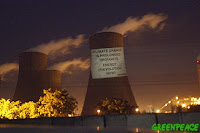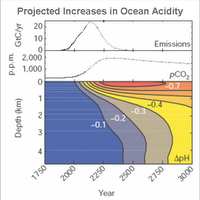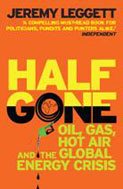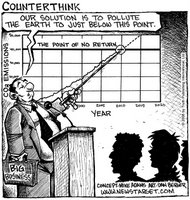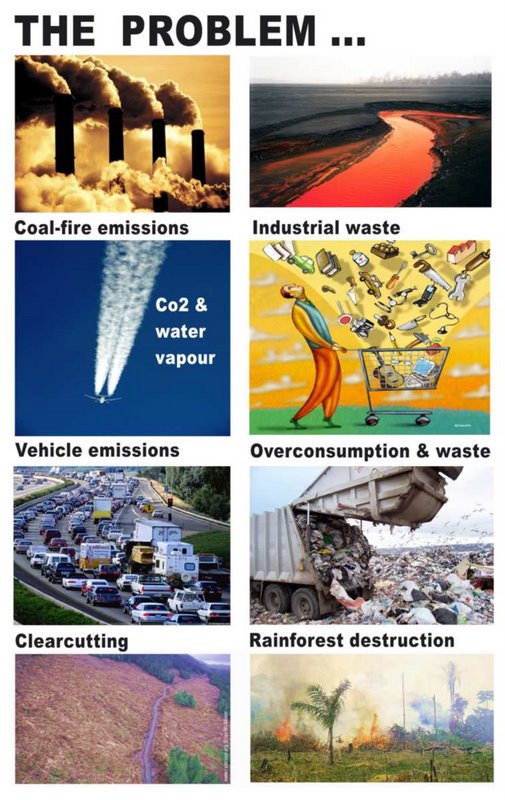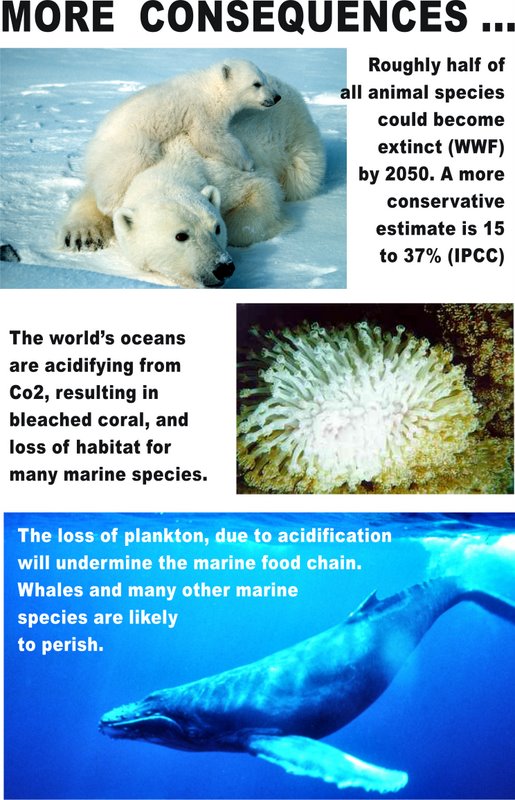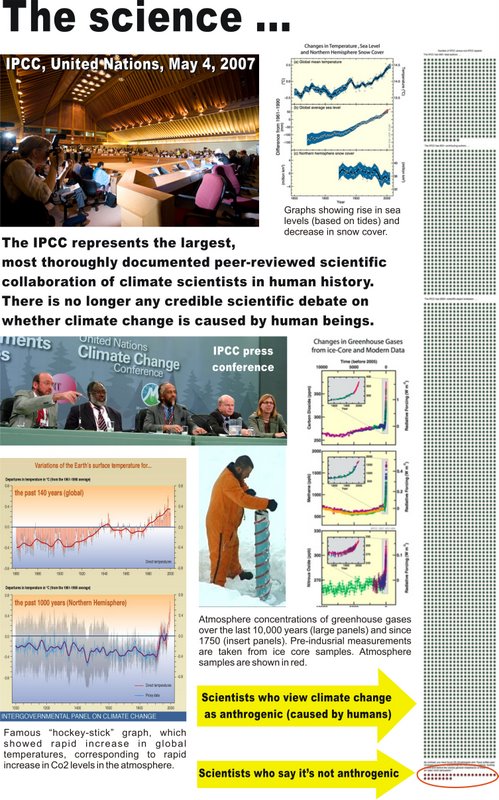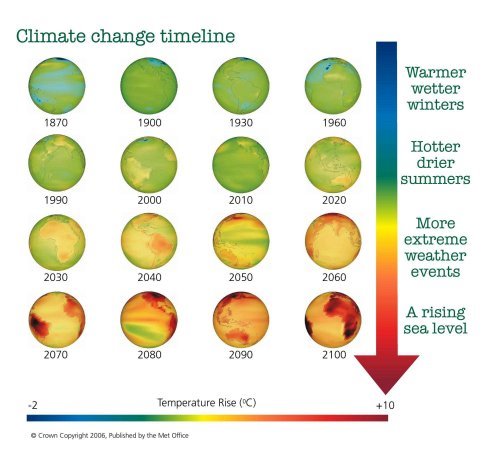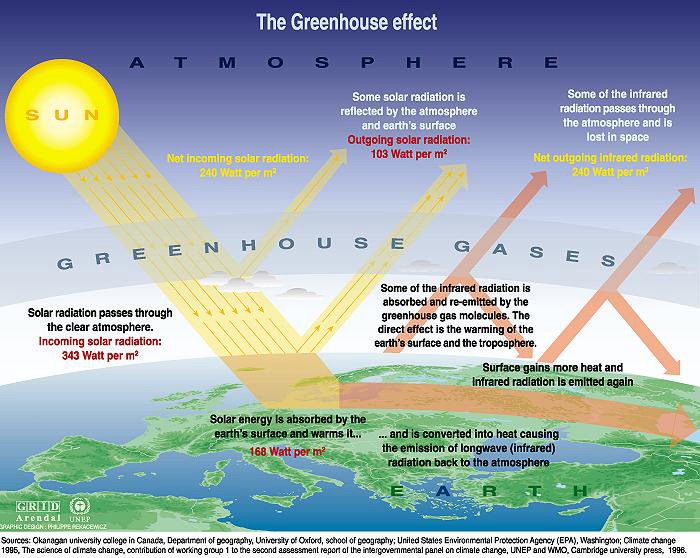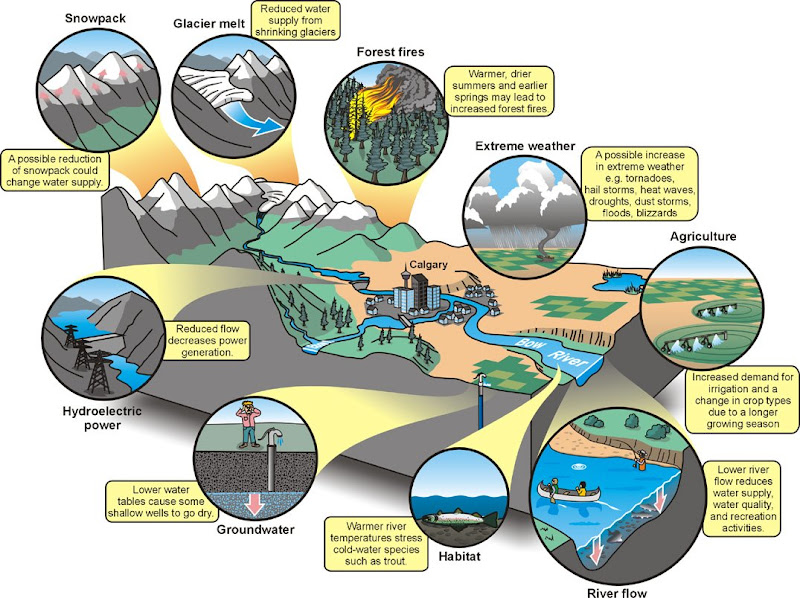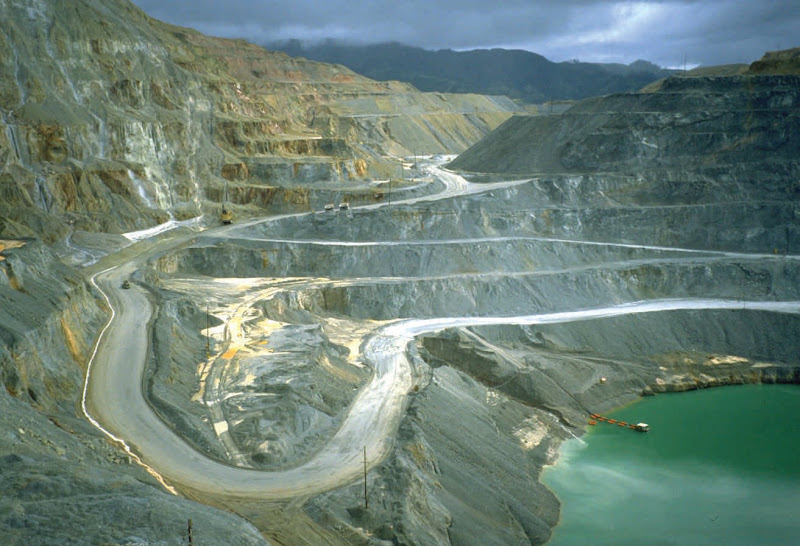 A quick and dirty report on the climate change conference at U of T (Nov. 1-3)
A quick and dirty report on the climate change conference at U of T (Nov. 1-3) Please note: this is my personal report -- some others who were there saw it differently (see comment by an engineer below) -- but everyone who has commented so far agrees that the direction of geo-engineering and opposing Kyoto is worrisome. Even more worrisome is that no one in the audience thought this problematic enough to say anything -- in fact all the speakers received warm applause.
Economists' message is appealingWhat I saw was that many conservative people who are not stupid enough to deny the threat of climate change are nevertheless concerned that the measures taken to mitigate will infringe on their privelaged way of life, which is built on cheap energy. They agree that behavioral change is necessary but are not willing to change themselves or are skeptical of the willingness of the rest of the world to do so. They are therefore receptive when eloquent economists like Scott Barret come along and tell them that technology is the answer.

Adaptation over mitigationThe new (and highly problematic) direction is to argue for "adaptation" over mitigation. While adaptation is necessary, recourse to technological adaptation is problematic if it releives us the responsibility of implementing mitgation for the sake of future generations. Adaptation can include waiting for new technoligies to emerge, even though existing technologies (i.e. renewables) are readily available. The use of adaptation to the exclusion of mitigation requires no change in lifestyle and allows the fossil fuel companies to continue with business-as-usual -- and this is the very source of the problem. It is a foolish direction built on an unjustified faith in technology.

Caption: The "carbon supersucker" (yet to be invented). See this
cute video which illustrates carbon sequestration technology.
Conservation and renewables given no weightI mentioned conservation and renewables several times in Q & A and many of the speakers claimed they support both, but in reality they gave them no weight. They preferred a technological solution, which has a seductive allure: it promotes the idea that more serious action (conservation and change of lifestyle) is unecessary.
Scott Barret and other speakers at the conference said renewables are not adequate. What they mean is that renewables cannot supply the necessary "base load" of our energy needs. The reality is that they can, but only with real conservation efforts, such as those advanced by George Monbiot. But talk of real conservation and changing the structures of society to bring about a 90% reduction in greenhouse gas emissions is not popular with those whose wealth is built on inequity and natural resource extraction.

Stacked panels At this event, a dozen or so high-level speakers -- experts on policy and economics and energy issues -- either endorsed nuclear power, geo-engineeering, and technological solutions to the climate crisis, or said nothing against those options. The whole conference was stacked in this direction. To be fair, there were a few speakers were not in this vein, maybe one per panel. Each panel consisted of 4 or 5 speakers and there were four panels and two keynote speakers in the main event. The student event on Nov. 3rd was entirely different and not as noteworthy as the main conference.
Anti-Kyoto, pro-technology None of the speakers appeared to be very strongly in favour of regulations to ensure conservation, energy efficiency measures and renewables. Kyoto was dismissed by the first speaker, Scott Barrett (of John Hopkins U), not because it didn't go far enough, but because international regulation to impose mandatory emissions reductions was deemed ineffective. Barret opted for the technological route and the second keynote speaker, Thomas Homer-Dixon (U of T) hammered the message home with the introduction of the idea that geo-engineering the planet's surface is an route we ought to seriously consider.
Scott Barret: "what I'm trying to do is steer the global system to a new place." Whether he would acknowledge this or not, what he is doing is helping the big corporations want to maintain an unsustainable status quo. Barret defends the Asia-Pacific conference and its R & D treaty. He said on Kyto: "you're not going to get it right the first time. A huge problem is that the U.S. walked away from the table." Such statements effectively endorse Harper's stance. In fact, Barret said don't blame Bush and Harper; blame the Kyoto protocol for being inadequate!
Technology is the answer, in his view. He uses the analogy of the oil tankers that used to dump their oil and some technology changed to allow them not to - all the international treaties for 50 years on this issue failed to do what this one technological innovation did. The problem with this analogy is that it refers to one issue; global warming is multi-faceted, requiring an overhaul of the way we life fundamentally, not a quick fix.

Caption: technology is the answer!"

No debate on ethics of technology There was no discussion or debate regarding the ethical problems associated with the technological solutions endorsed -- which include poisoning 8,000 generations with nuclear waste and the possibility of creating "dead zones" in the oceans or burning off the ozone latyer through massive geo-engineering projects. A blind faith in technology prevails; debate is dismissed in this context.
A pro-technology and adaptationist point of view is to address symptoms and not the cause of global warming. This is much like taking prescription drugs, but not changing one's diet or exercising -- in the end, one is still unhealthy and subject to the side-effects of the drugs. A moral stance on these questions is absolutey necessary. The economists dismiss morality and environmentalist concerns as childish. "An economist is someone who knows the price of everything and the value of nothing." - Oscar Wilde.

The goal: maintenance of the status quo Every solution offered was consistent with maintaining the current system of endless production and consumption and waste through globalization; this is why the Bush Administration recently endorsed technological solutions at the APEC conference. Barnett and others like him are advising the White House and they are now opting for the 'magic bullet.'
What it amounted to -- and this cannot be stated strongly enough -- is that they were looking for ways to solve the climate crisis without changing the over-consuming lifestyle and system of social injustice that it is built on. They would rather risk destroying life on Earth (a possible consequence of the Teller-Dyson stratosphere reflection idea) than challenge capitalism. They are operating within a narrow ideological range, which views the natural world as existing only for human consumption -- an anthropocentric ideology.

Caption: The "biofuel" solution now being promoted based on corn and palm oil takes food away from those who need it to fuel cars for the rich, destroys forests, causes mass homelessness, and produces substantial GHGs.
Why "realism" is in fact selling out In their defense we could say that they are "realistic" and "pragmatic" about the state of the world and international politics -- but (and this is critical) what this position omits is a consideration of the free will of individuals to make morally good (or evil) choices. They are really protecting their class interest and abdicating the personal moral responsibility to act for what is right and morally good: a solution that is just and sustainable, not a "magic bullet" technological quick fix that protects the unjust and unsustainable "business-as-usual" model.
A universally agreed on magic bullet does not yet exist, and if even if it did, what are the unforsee consequences? Real solutions do exist; why not pursue them? They cite cost but spend trillions on militarization and now propose to spend tens of millions on R & D, even though renewable conservation solutions exist.
"What does it profit a man if he gains the whole world but loses his soul?" - Jesus. "Climate altering" is a form of selling your soul because it transgresses on the sacred balance of nature and on human rights.

Caption: Geo-engineering solutions brought to you by the same folks who developed this nifty experiment
Dissent effectively supressed I wrote a critical note a week before the event worrying that it was anti-Kyoto. It was sent to several students and lists. A law student who received it on a list wrote me back, saying that the organizer was pro-Kyoto. On the strength of this note I remained open-minded regarding the conference and did not invite harcore activists to protest it. I was dissapointed that I had not done so, however, because the keynote speaker, Scott Barret, said that the problem was not with Harper but with Kyoto and essentially sided with Harper in consigning it to oblivion. I addressed him at Q & A and his answer was to suggest that I speak with him at the bar after the event.

Tough questions dismissed I spoke on four occasions at Q & A and at every turn I was refuted by the speakers, either in a patronizing way or a more rude, dismissive way: they either said that they used to feel as I did but were no longer so idealistic (the patronizing stance) and that environmentalists such as me are to blame for obstructing the real solutions: nuclear and "clean" coal (the dismissive stance).
John Drexhage was one of the latter. He said, "we need nuclear energy and vigorous clean coal capture technology." Referring to me specifically he said that "environmentalists like that have held up progress for years." He spoke against the "environmental contingent in Canada" because Greenpeace and others opposed nuclear energy. On this he said on nuclear: "you can't have it both ways" (meaning c.c. mitigation and no nuclear). Of course this is not true. If you decrease the demand on the base load through conservation an energy future without nuclear is entirely possible. Drexhage also advocated "sustainable development" and more funds for "R & D" even though much technology exists that is adequate to solve the problem (e.g. renewables) - they are just not being implemented widely. He works for Suncor and the pipeline / oil industry in Canada.

Environmental NGOs absent No one from the established environmental movement (Greenpeace etc) was there to refute nuclear in Q & A. Only Mark Winfield (formerly of Pembina) was there on the environmental side, but he said nothing against nuclear, for which I was critical of him in Q & A. He then admitted the issue, but then this exchange evoked some environmentalist-bashing by John Drexhage, a policy wonk also sat on the panel. It reminded me of OCAA's endorsement of the Portlands Energy Centre -- a narrow-minded solution to a single problem without consideration of HOW the problem is solved.
The illusion that we are seperate from natureThomas Homer-Dixon's message was good in terms of emphasizing the science that goes further than IPCC and showing that the crisis is real and dangerous for Canada -- but his suggested solution (geo-engineering) was premised on the idea that nature is there to be sacrificed for our self-preservation -- without consideration of the fact that "eco-cide" also condemns us to death in the end. It is a quick fix that fails to address the root problem. Some who listened to him thought that he did not advocate geo-engineering but instead thought it worth consideration under the circumstances. However, I understood him to mean that he endorsed its use.
Technologists are willing to create dead zones in the oceans to preserve the way of life in North America. In ethics this is called "instrumentalism" and allows for people and animals to be sacrificed for the use of an elite. The worst part is that it is unecessary -- if these same very eloquent men added their voices to those calling for solutions which address the source of the problem, it could save both human beings and the natural environment. We simply need to get rid of politicans who are standing in the way of solving this problem.
I spoke with Homer-Dixon after the talk. He cited China as a reason that he did not emphasize a major conservationist direction and why he preferred the technological route. He said that until last year he was arguing against geo-engineering but that now we can't avoid it. But how do we have the moral authority to steer China and India in the right direction (conservation, renewables, respect for human rights and the environment) if we don't go there ourselves? Moral force is a vastly underestimated force in the world - one that has a lot of political power.
Here is Dixon's comment in
The Globe & Mail on geoengineering, which he admits it is "appalling" but essentially says that we have no other choice (meaning that he has given up on mitigation efforts?)
The one thing you can say about geo-engineering is that presumes that human beings (some scientists and politicians) believe that they know the physical systems of the Earth so well that it is acceptable to manipulate them. This same arrogance is what informs much scientific and technological manipulation of the natural world from Descartes and Bacon onward: putting "nature on the rack."
On a positive note some speakers mentioned the need for carbon taxes, which I thought was good -- certainly better than what we have now.
The medium is the message As if to underscore the fact that changing the way we live in not an option to even be discussed, many of the speakers were flown in (despite the option of video conferencing) and there was a lavish banquet served (not vegan or 100% local food, needless to say). There was a lot of prestige. Waiters served hors d'ouvres and alcoholic beverages, to underscore the class status of the speakers. There was a fine exclusive dinner served afterwards on the Hart House patio. Nothing was environmentally friendly.
The use of academia to legitimize injustice Many of the speakers used public policy and law in the service of maintaining the status quo, not ever really addressing the source of the problem -- our separation from the natural world, and a consequent system of injustice built on the privelage of a minority over a majority.

Caption: The Munk Centre is uncritical of globalization and open-pit mining. Coincedentially, it is funded by Peter Munk, globalization advocate and mining baron.
The same critique has been applied to Peace & Conflict Studies: it provides not strong critique of war, but instead envisions itself as providing neutral commentary -- this academic treatment of war acts as a de facto endorsement of armed conflict.
In the same way, public policy on climate change and the environment talks about the Kyoto treaty, for instance, without consideration of the fact that such talk actually influences political discussion in a particular direction -- in other words, without recognizing the agency of academics to effect change.
But to acknowledge this would be to also acknowledge one's personal contribution to the problem and move to correct it -- in other words, to become an advocate of a particular direction. There is no such thing as neutrality when failure to take a stance in effect endorses the status quo.

Caption: Harper's legacy - climate change denial and false promises on the environment. They are continually citing the case of China, but Chinese emissions are still much less per capita than ours. See
Rich nations urged to ante up
The risks of geo-engineering Geoengineering, it should be noted, includes mirrors in space, iron filings in the sea to increase CO2 absorption, and other such experiments. This option is all about changing the planet rather than changing ourselves. It is the extreme of human hubris and arrogance to engage in "climate altering." See WWF opposition to
these experiments, already under way in the Galapogos Islands.
One of early geo-physicists was Edward Teller, the guy who invented the hydrogen bomb; he wanted to put reflective ballons in space - until someone showed that doing so would burn off the ozone layer. A lot of these guys have no problem with mass murder for the sake of advancing their particular technology.
Teller's 1998 article advancing sunlight-reflecting particles into the upper atmosphere:
Teller's articleIPCC's 2001 comment on Teller's idea:
"... most papers on geo-engineering contain expressions of concern about unexpected environmental impacts, our lack of complete understanding of the systems involved, and concerns with the legal and ethical implications (NAS, 1992; Flannery et al., 1997; Keith, 2000). Unlike other strategies, geo-engineering addresses the symptoms rather than the causes of climate change."
Source: IPPC on Teller ideaHere is Greenpeace's take on the issue:
Ocean Iron FertilizationAlso, see this critique of
geoengineeringAnd this:
commentary by climate scientists
Listening to the wrong guys Prof. Larry Schmidt's strong critique of technology is important in this regard but it is not well known (at this time). Other critiques of technology were not aired.
Meanwhile, the speakers, Thomas Homer-Dixon and Scott Barrett (and David Hughes on the peak oil side of the debate) are using using their great erudition and academic prestige to advance technological solutions that could be very problematic.
Barrett and other economists have the ears of the world leaders right now; it eases the politicians' job with voters in developing nations who want quick fixes. Those who have a more ethically sound message are ignored as flakes.
Careerism and social status within academia I got the feeling that the speakers used a technical language to establish rank over the audience and affirm their status as experts. The sociology of science confirms that is actually happens.
What I had to do at that conference is reveal my bias for a solution which rejects the status quo (in terms of established social and political hierarchies), which in their eyes made me look naive and foolish.
At the breaks I chose to hand out D8 flyers (many of which were rejected). In doing this and speaking as an activist I risked diminshment of social status with suit-and-tie academic cirlces, while most of the students in our group schmoozed with the "important people."
The same thing will be happening in Bali for the climate talks: schmoozing over drinks and public policy exchanges. Environmentalists have been going to these things for years and are probably used to getting sidelines. I read an account of this at the Rio Summitt in 1999 by Jeremy Legget (Carbon Wars); the Greenpeace delegate physically collapsed at the time!
For the policy wonks, this issue is a vehicle for them to live a fine life, get research grants and good job. It is a great shame that self-interest has infected the human race so thoroughly.
Some of the speakers and audience reminded me of Harper's conversion to action on climate change: motivated only by political expedience and perhaps the recognition that their personal fortune is at risk. See
Harper's climate change denial record. Also see this excellent piece on
The Seven Stages of Greenwash. I would say that many in the audience are at stage six and seven, that it is the fault of the Chinese and that it may be too late to act. I would add an eighth stage: It's not too late to act, but that action should not infringe on the way we live. Let nature bear the burden (i.e geo-engineering) and this can be fixed through a manipulation of markets and public policy (which of couse must include clean coal and nuclear!)
Rejection of morality, environmentalism, activism One speaker actually dismissed the "moral imperative" of environmental activism that I brought up and said that instead that only politics would prevail. In so saying, however, she reinforced a negative message: that activism is meaningless -- when in fact is the most meaningful thing anyone can do at this time. Their solution -- technology -- simply creates more problems because it is premised on seperation from the natural world.
Environmentalists dismissed Admist this posturing, anyone who identified himself as an environmentalist was dismissed. There was an uncomfortable silence on the part of some students when I ask them hand out flyers; they take them and pocket them. The best activists in the room were not students -- Sharon Howarth, Pieter Basedow, Rita Bijon -- except for James Nugent who was also good.
The problem with liberal reformersThe funny part is that the liberal reformers regard themselves as good enlightened people because they are tackling these issues in a very nuanced way which gives lip service to justice and ethics, while their more crass colleagues in the economic and business department are openly biased in favour of the interests of the ruling elite.
An
alternative global warming conference should include
* Problems with the technological solutions (nuclear, R & D spending, hydrogen, geoengineering, geosequestration, clean coal)
* Conservation & energy efficiency & renewables: how they are already successfully in use
* The use of adaptation and technology arguments to exclude mitigation and conservation
* Moving policy from a narrow ideological framework (law, economics) to a holistic, ecological framework that includes considerations of social justice, community participation and mitigating biodiversity loss.
* Greenwash and use of narrow ideological debate to implement potentially totalitarian solutions
* A critique of the lack of debate and lack of environmental assessment in the introduction of new technologies
Basically, we have to correct the path of the climate change movement from nuclear and geoingeering and to conservation and renewables. The issues have been hijacked by anti-envrionmentalists for obvious reasons: money, power. This has to be a cooperative effort by all environmentalists and those who care about social justice -- basically anyone with with a conscience.
Conclusion?
p.s. Check out this
weird radio message against geo-engineering for fun.

See this great article on how a small discrepancy in NASA data was seized by climate change deniers in feeding frenzy of exaggeration:
Climate Change: Deniers Jump on NASA Gaff, While Greenland on Verge of Meltdown.





































































































































































































































































.jpg)





































































































